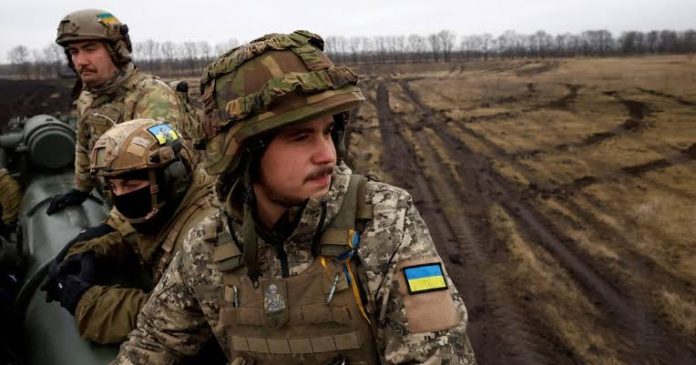Just over a year ago, most western commentators and policymakers had effectively written off Ukraine ever regaining control of Crimea, the peninsula which Russia invaded and annexed in early 2014.
Sure, it was still officially considered Ukrainian territory, and U.S. and European governments had denounced the invasion as unacceptable.
But while Russia’s claims to the province may not, in western eyes, have been legal, Ukraine’s allies appeared to acquiesce to the idea that Crimea holds a supposedly special place in Russian mythology and they weren’t sure it was worth a fight.
That view is now changing. A year after Russian President Vladimir Putin launched his disastrous war — which not only saw Russia annex further chunks of Ukraine, but which has already cost Russia more casualties than the U.S. saw in Vietnam — the geopolitical tides have shifted measurably.
The annexation
And in the past few months, with Ukrainian forces continuing to reclaim regions from Russian forces, western voices have begun revisiting a topic they’d long brushed off: Crimea.
Putin effectively abnegated the idea that Crimea is somehow unique in Russian eyes last September, when he announced the annexation of four further Ukrainian provinces (none of which Moscow controls). Politico reports.

Suddenly, Crimea’s nominally distinct status — as the only region the Kremlin would go so far as to annex outright — crumbled.
With Putin’s newest annexation announcements, the region that Putin claimed presented the ‘spiritual unity’ of Russians was now no different than places like Luhansk or Zaporizhzhia, which Ukrainian forces continue to liberate.
Those annexations further undercut Russia’s most pertinent and most impactful threats: that Crimea presents some kind of ‘red line’ for Russian authorities, after which the potential for nuclear war rises considerably.
READ ALSO: Man in his 30s DIES from flesh-eating bacterial infection he caught from eating raw oysters
But given how Ukraine has continued to bludgeon territories Russia has claimed elsewhere — and how explosions continue rocking Crimea itself, without any resultant nuclear war — Moscow’s supposed red lines have become increasingly blurred, even to the point of disappearing entirely.
As Russia expert Nigel Gould-Davies recently wrote in the New York Times, Putin ‘has no red lines.’
Indeed, the notion that Crimea presents any kind of final, formal ‘red line’ is slowly fading.
Even Blinken, who recently mentioned that Crimea might be such a ‘red line,’ indicated that such a framing isn’t nearly as important as it once was.
According to those familiar with Blinken’s views, the secretary of state believes ‘it is solely the Ukrainians’ decision as to what they try to take by force, not America’s’ — with the secretary of state ‘more open to a potential Ukrainian play for Crimea.’
Pandora’s box
As Blinken added this month, there will be no ‘just’ or durable’ peace unless Ukraine’s territorial integrity is restored.
‘If we ratify the seizure of land by another country and say ‘‘that’s okay, you can go in and take it by force and keep it,’’ that will open a Pandora’s box around the world for would be aggressors that will say, ”Well, we’ll do the same thing and get away with it,’” Blinken said.
All of these ingredients — the increasing military import of retaking Crimea; the shattering of Russian myths regarding the peninsula; upholding the principle that nuclear powers must never be allowed to carve up non-nuclear neighbors — have all begun combining, churning out a new perspective across western countries.
READ ALSO: Father and his two sons die as three-storey building COLLAPSES
A decade ago, when Putin initially launched his invasion of Crimea, the peninsula stood apart, a supposed crown jewel of Putin’s reign.
Western policy-makers
Now, though, it’s increasingly viewed as what it’s long been: a peninsula full of Ukrainians who never opted for Russian rule, watching Kyiv’s forces steadily gear up toward a southern push, looking to finally dislodge the Kremlin’s forces from all Ukrainian territory.

And this time, more western policy-makers — providing the arms, the financing and the diplomatic support necessary for Ukraine to finally achieve its goal of retaking ‘every inch’ of Russian-occupied Ukraine — are increasingly along for the ride.
‘No matter what the Ukrainians decide about Crimea in terms of where they choose to fight… Ukraine is not going to be safe unless Crimea is at a minimum, at a minimum, demilitarized,’ undersecretary of state Victoria Nuland recently said.
Or as Pentagon spokesperson Sabrina Singh announced last month, the U.S. will back Ukraine’s efforts to reclaim the peninsula it first lost nearly a decade ago.
‘That includes an operation in Crimea,’ Singh said.
‘That is a sovereign part of their country, and they have every right to take that back.’












